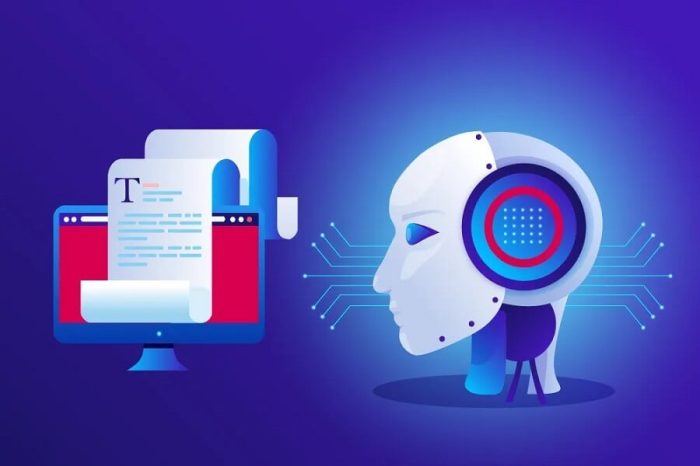Using AI for Content Creation dives into the cutting-edge technology shaping the future of writing, with AI tools and assistants leading the charge. From revolutionizing industries to ensuring quality content, AI is changing the game.
Exploring the impact of AI on traditional writing processes and the ethical considerations involved, this topic delves deep into the world of AI-generated content.
Overview of AI in Content Creation

AI is taking the world by storm, especially when it comes to content creation. With the ability to analyze data, learn patterns, and mimic human behavior, AI is revolutionizing the way content is produced across various industries.
Industries Benefiting from AI-driven Content Creation, Using AI for Content Creation
- Marketing: AI helps marketers create personalized content for targeted audiences, leading to more effective campaigns.
- Media and Entertainment: AI is used to generate movie scripts, music compositions, and even virtual influencers for social media.
- E-commerce: AI-powered chatbots and product descriptions enhance the shopping experience for online customers.
Impact of AI on Traditional Content Creation Processes
- Efficiency: AI tools can automate repetitive tasks like data analysis, allowing content creators to focus on more creative aspects.
- Personalization: AI algorithms can tailor content to individual preferences, increasing engagement and conversion rates.
- Quality: AI can generate error-free content at a rapid pace, ensuring consistency and accuracy in messaging.
AI Tools for Content Creation: Using AI For Content Creation
AI tools have revolutionized content creation by providing innovative solutions for generating engaging and relevant content. These tools are equipped with advanced algorithms that can analyze data, understand context, and produce high-quality content in a fraction of the time it would take a human writer. Let’s explore some popular AI tools used for content creation and compare their features to understand their advantages and limitations.
Popular AI Content Creation Tools
- 1. OpenAI’s GPT-3: GPT-3 is one of the most advanced AI models for natural language processing. It can generate human-like text based on the input provided, making it a versatile tool for content creation.
- 2. Jarvis by Conversion.ai: Jarvis is another popular AI tool that helps users generate blog posts, social media content, and ad copy. It uses AI to understand user input and provide relevant suggestions for content creation.
- 3. Writesonic: Writesonic is known for its user-friendly interface and ability to generate various types of content, such as product descriptions, blog posts, and email copy, making it a versatile tool for content creators.
Comparison of AI Content Creation Tools
| AI Tool | Features | Advantages | Limitations |
|---|---|---|---|
| OpenAI’s GPT-3 | Advanced natural language processing, versatile content generation | High-quality output, wide range of applications | Expensive subscription, limited customization |
| Jarvis by Conversion.ai | Blog post generation, social media content creation | User-friendly interface, relevant content suggestions | May lack in-depth analysis, limited customization options |
| Writesonic | Product descriptions, blog posts, email copy generation | Versatile content creation, easy to use | May produce generic content, limited customization features |
AI Writing Assistants

AI writing assistants are tools that use artificial intelligence to help users in creating high-quality content. These tools provide suggestions, corrections, and improvements to written text, making the writing process more efficient and effective.
How AI Writing Assistants Work
AI writing assistants work by analyzing the text input by the user and comparing it to a vast database of language rules, grammar structures, and writing styles. The AI algorithms then provide real-time feedback on spelling errors, grammar mistakes, and suggestions for better phrasing. Some advanced AI writing assistants even offer insights on tone, readability, and overall content quality.
Benefits of Using AI Writing Assistants
- Improved Writing Quality: AI writing assistants help writers produce error-free and engaging content.
- Time-Saving: These tools speed up the writing process by offering instant suggestions and corrections.
- Enhanced Creativity: AI writing assistants can inspire new ideas and help writers overcome writer’s block.
- Consistency: These tools ensure that the writing style and tone remain consistent throughout the content.
Tips for Maximizing the Effectiveness of AI Writing Assistants
- Customize Settings: Adjust the settings of the AI writing assistant to suit your writing style and preferences.
- Learn from Suggestions: Pay attention to the feedback provided by the AI tool and use it to improve your writing skills.
- Use Multiple Tools: Experiment with different AI writing assistants to find the one that best fits your needs.
- Proofread: While AI writing assistants are helpful, always remember to proofread your content manually for any overlooked errors.
AI-generated Content Quality
AI-generated content has come a long way in recent years, with advancements in natural language processing and machine learning algorithms. The quality of content produced by AI has improved significantly, but there are still challenges to overcome in ensuring accuracy and engagement.
One way to ensure AI-generated content is accurate and engaging is to provide clear guidelines and parameters for the AI to follow. By defining the scope and purpose of the content, as well as the target audience, we can help the AI generate more relevant and meaningful output.
Role of Human Oversight
Human oversight plays a crucial role in maintaining the quality of AI-generated content. While AI can process vast amounts of data and generate content quickly, it lacks the ability to understand context, emotions, and nuances like a human can.
To ensure accuracy and engagement, human editors and reviewers should review and refine the content generated by AI. They can correct errors, enhance the language and style, and inject creativity and personality into the content to make it more compelling for the audience.
Overall, a combination of AI technology and human expertise is key to producing high-quality content that is both accurate and engaging for readers.
Ethical Considerations in AI Content Creation
When it comes to using AI for content creation, there are several ethical considerations that need to be taken into account. One of the main concerns is the potential impact on plagiarism and copyright issues. As AI tools become more advanced, there is a risk that content generated by AI could infringe on existing copyrights or be too similar to existing work, leading to accusations of plagiarism.
Implications of AI-generated Content on Plagiarism and Copyright Issues
In the realm of content creation, AI has the ability to generate large amounts of text in a short amount of time. This poses a challenge when it comes to ensuring that the content produced is original and does not violate any copyright laws. With AI’s ability to analyze vast amounts of data and mimic writing styles, there is a risk that AI-generated content may inadvertently resemble existing work, raising questions about intellectual property rights and ownership.
- AI-generated content may inadvertently plagiarize existing work, leading to legal disputes and damage to reputations.
- Ensuring that AI-generated content is original and does not infringe on existing copyrights can be a challenging task.
- Content creators must be vigilant in monitoring AI-generated content to avoid potential plagiarism issues.
Importance of Transparency in Disclosing AI Involvement in Content Creation
Transparency plays a crucial role in ethical content creation using AI. It is essential for content creators to disclose when AI tools have been used in the content creation process. This transparency not only helps maintain credibility and trust with the audience but also ensures that proper credit is given to the technology involved in generating the content.
Disclosing AI involvement in content creation is not only ethical but also necessary to maintain integrity and trust with the audience.
- Transparency about AI involvement helps establish trust with the audience and avoids misleading them about the origin of the content.
- Proper disclosure of AI technology usage gives credit where credit is due and acknowledges the role of AI in the creative process.
- Failure to disclose AI involvement in content creation can lead to issues of transparency and authenticity, potentially damaging the reputation of content creators.
